人教版八年级英语下册Unit单元知识汇总
新人教版|八年级下册英语所有知识点大汇总
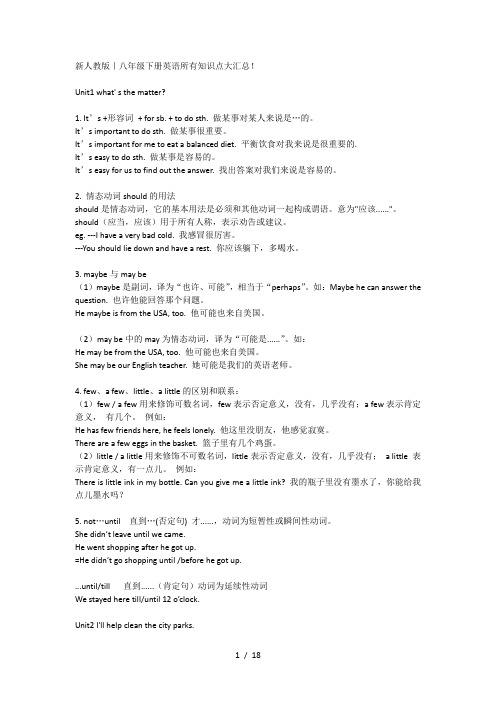
新人教版|八年级下册英语所有知识点大汇总!Unit1 what' s the matter?1. It’s +形容词+ for sb. + to do sth. 做某事对某人来说是…的。
It’s important to do sth. 做某事很重要。
It’s important for me to eat a balanced diet. 平衡饮食对我来说是很重要的.It’s easy to do sth. 做某事是容易的。
It’s easy for us to find out the answer. 找出答案对我们来说是容易的。
2. 情态动词should的用法should是情态动词,它的基本用法是必须和其他动词一起构成谓语。
意为"应该......"。
should(应当,应该)用于所有人称,表示劝告或建议。
eg. ---I have a very bad cold. 我感冒很厉害。
---You should lie down and have a rest. 你应该躺下,多喝水。
3. maybe与may be(1)maybe是副词,译为“也许、可能”,相当于“perhaps”。
如:Maybe he can answer the question. 也许他能回答那个问题。
He maybe is from the USA, too. 他可能也来自美国。
(2)may be中的may为情态动词,译为“可能是......”。
如:He may be from the USA, too. 他可能也来自美国。
She may be our English teacher. 她可能是我们的英语老师。
4. few、a few、little、a little的区别和联系:(1)few / a few用来修饰可数名词,few表示否定意义,没有,几乎没有;a few表示肯定意义,有几个。
例如:He has few friends here, he feels lonely. 他这里没朋友,他感觉寂寞。
人教版八年级英语下册Unit-1--Unit-3-单元知识点归纳
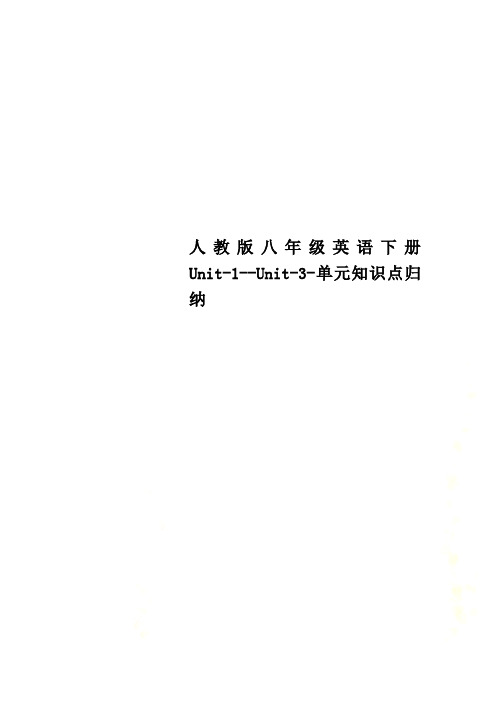
人教版八年级英语下册Unit-1--Unit-3-单元知识点归纳free【动词】使……解脱,得到自由He could not free his arm.free from21. run out用完,用尽 When his water run out, he knew that he would have to do something to save his own life.物sth. tun out. 某物用尽了。
人sb. run out of物sth..人用尽了某物。
He run out of all his money last night.22.risk sth to do sth. 冒着...的风险去做某事 take a risk=take risks 冒险risk doing ...=take the risk of doing ...23. the importance of (doing) sth.(做)某事的重要性 We students should know the importance of (learning) English.importance n. 重要(性), important adj.重要的,unimportant adj.24.decision 【名词】决定;抉择; make a decision to do sth.decide25. be in the control of …掌管,管理 The headmaster is in the control of this new school. be out of control无法控制,无法管理 be under control被控制住,在控制之中26. 【复习】mind意为介意,Would you mind my opening the window?27. give up (doing) sth. 放弃(做)某事,give up (playing) computer games;give up后可接名词、代词和动词ing形式,也可不接,如 Never give up easily.II. 重点短语1. have a fever 发烧2. have a cough 咳嗽3. have a toothache 牙疼4. talk too much 说得太多5. drink enough water 喝足够的水6. have a cold 受凉;感冒7. have a stomachache 胃疼8. have a sore back 背疼9. have a sore throat 喉咙痛10. lie down and rest 躺下来休息11. hot tea w ith honey 加蜂蜜的热茶12. see a dentist 看牙医13. get an X-ray 拍X 光片14. take one’ s temperature量体温15. put some medicine on sth. 在……上面敷药16. feel very hot 感到很热17. sound like 听起来像18. all weekend 整个周末19. in the same way 以同样的方式20. go to a doctor 看医生21. go along 沿着……走22. on the side of the road 在马路边23. shout for help 大声呼救24. without thinking twice 没有多想25. get off 下车26. have a heart problem 有心脏病27. to one’ s surprise使....... 惊讶的28. thanks to 多亏了;由于29. in time 及时30. save a/one’s life挽救生命lose one's life 31. get into trouble 造成麻烦32. right away 立刻;马上33. because of 由于34. get out of 离开;从……出萍35. hurt oneself 受伤36. put a bandage on sth. 用绷带包扎37. fa ll down 摔倒38. feel sick 感到恶心39. have a nosebleed 流鼻血40. cut his knee 割伤他的膝盖41. put her head back 把她的头向后仰42. have problems breathing 呼吸困难43. mountain climbing 登山运动44. be used to doing sth. 习惯做某事45. run out (of) 用完;用尽46. so that 以便47. so. . . that 如此… …以至于…48. be in control of 掌管;管理49. in a difficult situation 在闲境屮50. keep on doing sth. 继续或坚持做某事51. make a decision 做出决定52. take risks 冒险53. give up 放弃III. 重点语法【反身代词】英语中共有八个反身代词,在使用时应注意和它所指的相应的对象在人称、性别、数上保持一致。
Unit1-Unit10单元知识点人教版英语八年级下册
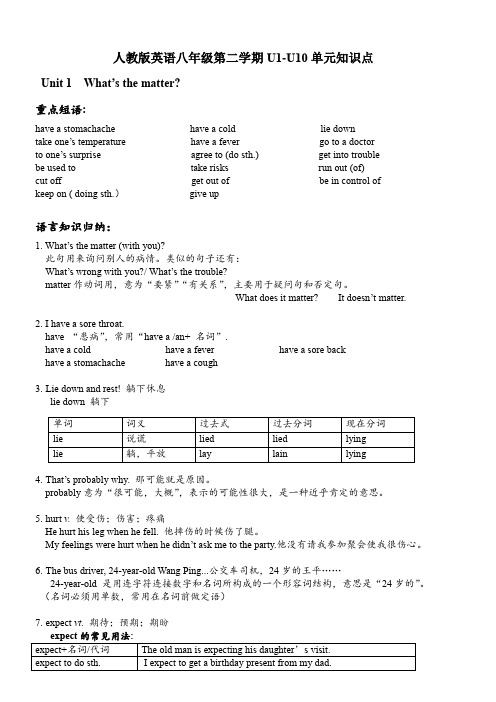
人教版英语八年级第二学期U1-U10单元知识点Unit 1 What’s the matter?重点短语:have a stomachache have a cold lie downtake one’s temperature have a fever go to a doctorto one’s surprise agree to (do sth.) get into troublebe used to take risks run out (of)cut off get out of be in control ofkeep on ( doing sth.)give up语言知识归纳:1. What’s the matter (with you)?此句用来询问别人的病情。
类似的句子还有:What’s wrong with you?/ What’s the trouble?matter作动词用,意为“要紧”“有关系”,主要用于疑问句和否定句。
What does it matter? It doesn’t matter.2. I have a sore throat.have “患病”,常用“have a /an+ 名词”.have a cold have a fever have a sore backhave a stomachache have a cough3.Lie down and rest! 躺下休息lie down 躺下4.That’s probably why. 那可能就是原因。
probably意为“很可能,大概”,表示的可能性很大,是一种近乎肯定的意思。
5.hurt v.使受伤;伤害;疼痛He hurt his leg when he fell. 他摔伤的时候伤了腿。
My feelings were hurt when he didn’t ask me to the party.他没有请我参加聚会使我很伤心。
最全面人教版八年级下册英语第一单元知识点归纳总结

Unit 1 What's the matter?一、词汇与短语◆重点单词A部分1.matter n. 问题;事情2.sore adj. 疼痛的;酸痛的3.stomachache n. 胃痛;腹痛4.foot n. 脚;足5.neck n. 颈;脖子6.stomach n. 胃;腹部7.throat n. 咽喉;喉咙8.hurt v. (使)疼痛;受伤9.fever n. 发烧10.passenger n. 乘客;旅客11.lie v. 躺;平躺12.break n. 间歇;休息13.rest v. &n. 放松;休息14.onto prep. 向;朝15.X-ray n. X射线;X光16.trouble n. 问题;苦恼17.toothache n. 牙痛18.hit n. (用手或器具)击;打19.headache n. 头痛20.herself pron. (she的反身代词)她自己21.off adv. & prep. 离开(某处);不工作;从……去掉B部分1.bandage n. 绷带v. 用绷带包扎2.press v. 压;挤;按3.sick adj. 生病的;有病的4.knee n. 膝;膝盖5.breathe v. 呼吸6.knife n. 刀7.sunburned adj. 晒伤的8.blood n. 血9.ourselves pron. (we反身代词)我们自己10.mean v. 意思是;打算11.climber n. 登山者;攀登者12.importance n. 重要性;重要13.risk n.&v. 危险;风险;冒险14.decision n. 决定;抉择15.accident n.(交通)事故;意外遭遇16.control v.&n. 限制;约束;管理17.situation n. 情况;状况18.spirit n. 勇气;意志19.kilo( = kilogram) n. 千克;公斤20.death n. 死;死亡21.rock n. 岩石22.nurse n. 护士◆重点短语A部分1.have a cold 感冒2.lie down 躺下3.have a stomachache 胃痛4.take one's temperature 量体温5.have a fever 发烧6.to one's surprise 使……惊讶的是7.get off 下车8.right away 立即;马上9.take breaks (take a break) 休息10.talk too much 说得太多11.drink enough water 喝足够的水12.have a very sore throat 嗓子非常疼13.get an X-ray 拍X光片14.see a dentist 看牙医15.drink some hot tea with honey 喝一些加蜂蜜的热茶16.put some medicine on sth.在……上面敷一些药17.feel very hot 感到很热18.sound like 听起来像19.all weekend 整个周末20.in the same way 以同样的方式21.go to a doctor 看医生22.go along 沿着……走23.on the side of the road 在马路边24.shout for help 大声呼救25.without thinking twice 没有多想26.have a heart problem 有心脏病27.thanks to 多亏了;由于28.in time 及时29.save a life 挽救生命30.get into trouble 陷入麻烦31.hurt oneself 受伤32.fall down落下;摔倒B部分1.be used to 习惯于……;适应于……2.in a difficult situation 在困境中3.take risks (take a risk) 冒险4.keep on doing sth. 继续(或坚持)做某事5.run out (of) 用尽;耗尽6.make a decision 作出决定7.cut off 切除8.get hit on the head 撞到头部9.get out of 离开;从……岀来10.be interested in 对……感兴趣11.give up 放弃12.mean doing sth. 意味着做某事13.put a bandage on sth. 用绷带包扎…14.lose one's life 失去生命15.feel sick 感到恶心16.mountain climbing 登山运动17.have problems breathing 呼吸困难18.be in control of 掌管;管理◆重点句子A部分1.What's the matter with you?=What's the trouble with you?=What's wrong with you?你怎么了?2.What should she do? 她该怎么办呢?3.Did you fall down? 你跌倒了吗?4.Should I take my temperature? 我应该量一下体温吗?5.I think I sat in the same way for too long without moving.我想我以同样的姿势一动不动地坐得太久了。
最新人教版八年级英语下册第一单元知识点汇总

最新人教版八年级英语下册第一单元知识点汇总Unit 1 What’s the matter?一、基础知识1.我感冒了。
可以表达为I had a cold、catch a cold或have the flu。
have a fever表示发烧,have a cough表示咳嗽,have a stomachache或肚子疼表示胃疼,have a toothache表示牙疼,have a headache表示头疼。
2.将身体部位和ache(疼痛)结合起来构成新的复合词,如stomach+ache=stomachache,head+ache=headache,tooth+ache=toothache,back+ache=backache,表示相应的疼痛。
3.“怎么啦?出什么事情了?”可以表达为What’ s the matter。
也可以用What’ s the trouble with you?或What’ s wrong with you。
matter和trouble为名词,其前可加the或形容词性物主代词,而wrong是形容词不能加the。
用于询问某人有什么病或遇到什么麻烦、问题,其后跟询问对象时,与介词with连用,如What’s the matter with sb。
= What’s your trouble?= What’s up?= What happens to sb。
举例来说,当问到“What’s the matter with you?”时,回答可以是“I have a bad cold.”4.maybe表示“或许”,常用于句首,表示可能性,后加句子。
例如Maybe you are right。
may be是情态动词+be的结构,意为“可能,也许”,后加名词、代词或形容词。
例如He maybe angry。
sound like可以和名词、代词以及从句结合使用,如It sounds like you don’t know the truth.It sounds like a good idea。
人教版英语八年级下册Unit 1-5 单元语法知识梳理
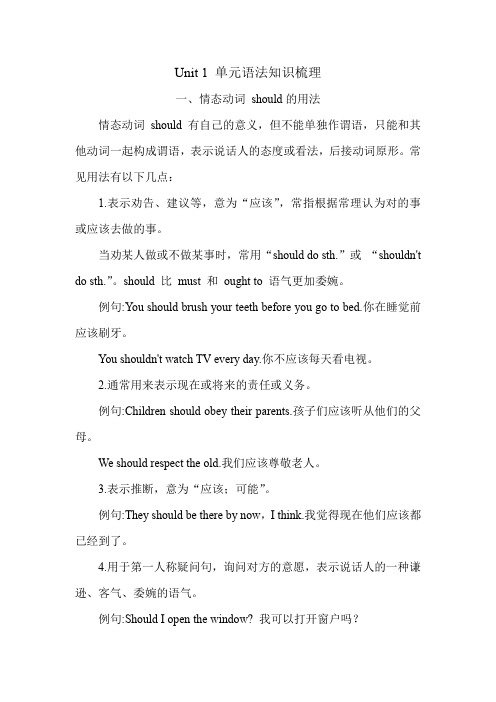
Unit 1 单元语法知识梳理一、情态动词should的用法情态动词should有自己的意义,但不能单独作谓语,只能和其他动词一起构成谓语,表示说话人的态度或看法,后接动词原形。
常见用法有以下几点:1.表示劝告、建议等,意为“应该”,常指根据常理认为对的事或应该去做的事。
当劝某人做或不做某事时,常用“should do sth.”或“shouldn't do sth.”。
should 比must 和ought to 语气更加委婉。
例句:You should brush your teeth before you go to bed.你在睡觉前应该刷牙。
You shouldn't watch TV every day.你不应该每天看电视。
2.通常用来表示现在或将来的责任或义务。
例句:Children should obey their parents.孩子们应该听从他们的父母。
We should respect the old.我们应该尊敬老人。
3.表示推断,意为“应该;可能”。
例句:They should be there by now,I think.我觉得现在他们应该都已经到了。
4.用于第一人称疑问句,询问对方的意愿,表示说话人的一种谦逊、客气、委婉的语气。
例句:Should I open the window? 我可以打开窗户吗?What should we do now? 我们现在该干什么呢?5.表示某种感情色彩,意为“竟会”,常用于以how, why开头引导的特殊疑问句中。
例句:Why should you be so early today? 你今天为什么会如此早?二、反身代词1.反身代词的构成反身代词是一种表示反射或强调的代词。
它由第一人称、第二人称的形容词性物主代词和第三人称代词的宾格加词尾-self或-selves构成。
其构成如下表:反身代词与它所指代的名词或代词形成互指关系,两者在人称和数上应保持一致。
Unit1语法知识点梳理人教版英语八年级下册

人教版八年级英语下册语法知识点Unit1. What’s the matter?▶短语归纳1.have a cold 感冒2. have a stomachache 胃痛3. have a headache 头痛4. have a sore throat 喉咙痛5. have a fever 发烧6. have a cough 咳嗽7. have a heart problem 有心脏病8.hurt oneself伤到自己9.cut oneself割伤自己10.fall down 摔倒;跌倒11.get hit/sunburned 被击中/晒伤12. lie down 躺下13. take breaks/take a break 休息14. go to a/the doctor 看医生15.see a dentist 看牙医16. get an Xray 拍个X光片17. take one's temperature 量体温18. put some medicine on...在…上敷些药19.take sb. to the hospital带某人去医院20. take risks/take arisk冒险21.lose one’s life 失去生命22.run out(of)用尽;耗尽23.cut off 切除24.away from 远离25. make a decision /make decisions 做决定26.sound like 听起来好像27.get out of离开;从………出来28. get off 下车29. get to 到达30.get into 陷人;参与31.wait for 等待32.think twice 慎重考虑,再三考虑33.think about 考虑34. go mountain climbing 去爬山35. give up 放弃36. tell of叙述;描述37. the importance of……的重要性38. be interested in 对……感兴趣39. be in control of掌管;管理40.to one ’s surprise 使某人惊讶的是; 出乎某人的意料 41.thanks to 多亏;由于 42.in time 及时43.right away=at once 立即;马上 44. because of 因为 45.by oneself 独自;单独 46. too much 太多 47.a few 一些48.all weekend 整个周末 49. so that 以便▶用法集萃sth.需要某物1. needto do sth.需要做某事doing sth.某事需要被做2. see sb ..doing sth.看见某人正在做某事 do sth.看见某人做了某事3.mean to do sth.打算做某事 doing sth.意味着做某事4. expect/want (sb. ) to do sth 期待(某人)做某事/想要(某人)做某事 6. seem(to be)+形容词 好像……seem to do sth.好像做某事 seem + that 从句 好像.…7. agree/happen to do sth. 同意做某事/碰巧做某事 8.help sb.(to)do sth. 帮助某人做某事9.tell sb.(not)to do sth. 告诉某人(不要)做某事10.have problems(in)doing sth. 做某事有困难11. use sth. to do sth.= use sth. for doing sth.用某物做某事12. give up/ keep on doing sth. 放弃做某事/继续做某事13.mind doing sth.介意做某事14.so+形容词/副词+that从句15.It is/was+形容词+ that 从句如此……以至于…"某事是…▶语法专项一.询问某人的健康问题及遇到麻烦时的常用表达1.询问某人患了何种疾病或遇到了何种麻烦时,常用以下几种结构来表达: What's the matter (with sb.)?(某人)怎么了?What's wrong (with sb.)?(某人)怎么了?What's the trouble ( with sb.)?/ (某人)出什么事了?What happened (to sb.)?(某人)发生什么事了?Are you OK?你没事吧?Is there anything wrong( with sb. )?(某人)有什么事吗?2.要表达身体某一部位疼痛或不舒服,可用以下结构:(1)某人+have/has+病症The twins have colds.这对双胞胎感冒。
人教版八年级英语下册各单元知识点总结完整版

Unit 1 What’s the matter?一、重点短语1. have a fever 发烧2. have a cough 咳嗽3. have a toothache 牙疼4. talk too much 说得太多5. drink enough water 喝足够的水6. have a cold 受凉;感冒7. have a stomachache 胃疼8. have a sore back 背疼9. have a sore throat 喉咙痛10. lie down and rest躺下来休息11. hot tea with honey加蜂蜜的热茶12. see a dentist看牙医13. get an X-ray拍X光片14. take one’ s temperature量体温15. put some medicine on sth在……上面敷药16. feel very hot 感到很热17. sound like 听起来像18. all weekend 整个周末19. in the same way以同样的方式20. go to a doctor 看医生21. go along 沿着……走22. on the side of the road 在马路边23. shout for help 大声呼救24. without thinking twice 没有多想25. get off 下车26. have a heart problem 有心脏病27. to one’ s surprise 使……惊讶的28. thanks to 多亏了;由于29. in time及时30. save a life 挽救生命31. get into trouble 造成麻烦32. right away 立刻;马上33. because of 由于34. get out of 离开35. hurt oneself 受伤36. put a bandage on sth. 用绷带包扎37. fall down 摔倒38. feel sick 感到恶心39. have a nosebleed 流鼻血40. cut his knee割伤他的膝盖41. put her head back 把她的头向后仰42.have problems breathing呼吸困难43. mountain climbing登山运动44. be used to doing sth. 习惯做某事45. run out (of) 用完;用尽46. so that 以便47. so…that 如此……以至于……48. be in control of 掌管;管理49. in a difficult situation 在逆境屮50. keep on doing sth.坚持做某事51. make a decision做出决定52. take risks 冒险53. give up 放弃二、知识点解析1. What’s the matter? 怎么了?若是询问“某人怎么了?”要用“What’s the matter with sb.?”拓展:What’s the matter with sb.? 的同义句:What’s wrong with sb.? / What’s the trouble with sb.?2.疾病类短语:have a +疾病. e.g. :have a fever 发烧have a cold 感冒have a cough 咳嗽.have a +身体部位-ache. e.g.: have a headache 头痛have a toothache 牙痛.have a sore+身体部位. e.g.: have a sore throat咽喉痛have a sore back背痛例题:Mom, I____________.I’m sorry to hear that, dear. We must go to see the dentist right away.A. have a headacheB. have a stomachacheC. have a toothacheD. have a fever3. lie down 躺下V. 躺,平躺。
人教版八年级下册英语各单元知识点归纳总结

人教版八年级下册英语各单元知识点归纳总结八年级研究群人教版八年级下册英语各单元知识点归纳总结Unti1 what’s the matter?短语归纳1.too much太多2.lie down躺下3.get an X-ray做个X光检查4.take one’s temperature量体温6.have XXX发烧7.XXX休息8.without XXX没多想9.get off下车10.XXX送某人去医院11.wait for等待13.XXX to多亏于;因为14.in time实时15.think about考虑16.have a heart problem患有心脏病17.get into the trouble遇到麻烦18.do XXX做正确的事情事情19.fall down跌倒21.get hit/sunburned摔伤/烧伤23.be used to惯于....24.XXX挑战25.XXX落空生命26.because of因为27.run out of用完28.cut off切除29.get out of从...出来30.XXX做决意31.be in control of掌管;管理32.give up放弃用法归纳1.need to do sth .需要去做某事2.XXX看见某人正在做某事3.XXX询问某人某事4.4.XXX期望某人做某事5.agree to do XXX同意做某事6.help sb (to) do XXX匡助或人做某事7.want to do XXX想要做某事8.tell sb to do sth通知或人做某事9.have problems(in) XXX做某事有困难10.XXX用某物去做某事used to doing XXX惯于做某事12.seem to do XXX好像做某事13.keep XXX继续做某事14.XXX做某事语法点1.讯问或人的安康题目及碰到贫苦的表达办法2.情态动词should的用法3.不定代词的用法Unit 2 I’ll help to clean the city parks短语归纳1.clean up打扫干净2.cheer up(使)变得更高兴;振奋起来3.give out分发5.give away赠予;捐赠6.set up树立;设立7.make a difference有作为e up with想出9.put off推迟10.put up张贴11.call up打电话给13.care for照顾;照看14.give up放弃15.try out for参加选拔e true实现17.run out of用光19.fix up修理用法归结1.need to do sth需要做某事2.make plan to do sth制订打算做某事3.ask sb (not ) to do sth请求或人(不要)做某事ed to do sth曩昔经常做某事5.decide to do XXX决意做某事6.help sb (to)do XXX帮助某人做某事8.make it possible for sb to do sth使得做某事对或人来讲是可能的拓展链接动词+副词短语XXX up使高鼓起来clean up清扫洁净put up张贴mix up 修缮give away赠送give out分发give up放弃use up用光get up起床hand in上交put off推延pick up捡起think over细致思考turn down关小音量set up建立set off出发look out小心动词+介词短语hear of听说pay for支付wait for等待动词+副词+介词短语get out of制止come up with想出catch up with追上遇上look forward to等候渴望go on with继续动词+名词短语have a rest苏息一下take a walk漫步make XXX出错have a try试一下XXX发生tell a XXX撒谎make a decision做决定动词+名词+介词短语Be+形容词+介词短语XXX for迟到be angry with生气be fond of喜欢be good at 擅长动词不定式归纳只跟动词不定式做宾语的动词决心学会有希望(decide,learn,wish,hope)同意计划莫假装(agree,plan,pretend)忘记拒绝会失望(forget,refuse,fail)准备设法来帮忙(prepare,try,manage,help)提供请求负担起(offer,beg,afford)记得阻止理应当(remember stop,be supposed)题链接1.-Tom failed the exam again-Sorry to hear that. We should do XXX.A. XXXC.XXX2.XXX.A. XXXC. XXX cleaning3.XXX XXX.A. used to beB. is used to beC.was used to beD.is4.The old man lives,but he doesn’t feel .A. alone;XXX;lonelyC.lonely;aloneD. alone;lonely5.XXX, I have XXX tell6.--The old manall his money to a XXX.We all feel after hear of the news.A.excited;excitingB.exciting;excitingC.excited;excitingD.exciting;excitedUnit3 Could you please clean your room?短语归结1.do XXX洗餐具2.XXX out the XXX倒垃圾3.at least至少4.throw down扔下5.all the time一向;重复6.in surprise惊讶地10.provide XXX向某人提供某物11.depend on依赖;信赖12.look after照顾;照看13.take care of照顾14.as a result结果用法归结1.XXX XXX做完某事2.want sb to do XXX想要某人做某事3.try (not) to do sth尽力(不)做某事4.let sb do XXX让或人做某事6.XXX做某事7.learn to do sth研究做某事8.learn how to do sth研究怎样做某事语法点神态动词could的用法表示请求与准许,could委婉有礼貌;表示能力会不会,could只把过去表Unit 4 why don’t you talk to your parents?短语归结1.too much太多(修饰不可数名词)2.hang out闲逛3.too many太多(修饰可数名词复数)4.get into a fight争吵5.call sb up给某人打电话6.XXX谈论7.XXX浏览8.give back清偿9.be angry with sb生或人的气10.a big deal紧张的工作11.work out解决;算出12.get on with sb与某人和睦相处13.XXX与某人交流16.in front of在...前面17.not... any more不再...18.so much/many那末多pete with sb与某人竞争20.cut out删除;删去21.all kinds of各类百般23.XXX...看24.turn down调小用法归纳1.allow sb to do XXX允许某人做某事2.why don’t you do sth?为甚么不做某事呢?3.why not do sth ?为什么不做某事呢?4.find sb doing XXX发觉或人在做某事5.tell sb to do XXX告诉某人做某事6.refuse to do XXX回绝做某事7.let sb do XXX让或人做某事8.offer to do XXX主动提供做某事9.not....until....直到....才...10.it’s time to do sth该做某事了12.keep XXX连续做某事13.what do you think of...?你认为....怎么样?语法点came?短语归纳1.wait for等候2.look for寻觅3.go off (闹铃)发出声音4.XXX洗澡5.pick up接德律风;捡起6.make sure确信;务必7.have fun玩的开心8.fall asleep入眠;睡觉9.die down逐突变弱;逐步消逝10.wake up醒来;叫醒11.in a mess杂乱无章12.take photos照相13.turn on翻开14.in silence缄默沉静地;无声地15.XXX down摧毁;拆卸;记下16.tell XXX说实话17.point out指出18.go XXX消逝19.as well也用法归结1.XXX忙于(做)某事2.XXX看见某人或某物正在做某事3.begin/start to do sth开始做某事4.try to do XXX努力去做某事5.have trouble(in)doing sth做某事有艰巨语法点曩昔举行时过去进行最好记,was/were+doing特定时间有暗示,过去某刻某时段一定主语在句首,普通问句Be提早否定句式更简朴,Be后只把not添Unit 6 An old man tried to move the mountains短语归纳1.work on从事3.XXX...XXX拿走,带走4.a good way to do sth做某事的好办法5.a little bit一点儿6.once upon a time从前7.turn...into..变成8.XXX呈现,出版,结果是9.get married立室10.fall in love with sb爱上某人11.be born出生12.all over the world全球13.make a plan to do sth制订打算做某事14.along the way沿路15.be lost迷路16find out找出17.learn about了解用法归纳1.try to do sth设法做某事2.XXX XXX完成做某事3.continue to do XXX连续做某事4.make sb do XXX让某人做某事5.keep XXX一向做某事6.instead of XXX代替做某事7.be able to do能够做某事9.have no time to do sth没有工夫做某事10.XXX XXX对做某事感乐趣11.can’t stop doing XXX禁不住做某事12.XXX听到或人正在做某事13.XXX引导某人到某处14.XXX把某物遗忘在某地15.XXX向某人展示某物语法点1.unless引导的条件状语从句2.XXX...引导的结果状语从句3.as soon as指导的工夫状语从句Unit7 XXX?短语归纳1.take in吸入;吞入2.in the face of面临(题目;艰巨)3.XXX出身时4.as you can see正如你所看到的5.as far as I know据我所知6.up to直到7.prepare ...for...为...筹办...8.fall over摔倒10.cut down砍倒11.take care of照顾;照看12.or so大约;左右13.in XXX处于危险之中用法归纳4.what’s the+形容词最高级+名词in the world?世界上最....的....是什么?5.XXX..保护....使不受;防备6.XXX胜利做成某事8.send sb to do XXX派某人去做某事1.数词hundred,thousand,million,XXX的用法2.形容词和副词的比较级和最高级用法比较级变革划定规矩比较品级要变革,普通词尾加-er词尾如有哑音e,间接加r就能够一辅重读闭音节,辅音字母要双写辅音字母加y结尾,要把y改i加erUnit8 Have you read Treasure Island yet?短语归纳1.be full of充满2.grow up长大3.XXX up赶快4.XXX带回到某地5.more than超过6.in the middle of在....中央7.fight over为....争吵;争斗8. think about斟酌9.XXX XXX开始意识到10.ever since then从那时起11.a kind of一种12.such as比方13.XXX属于14.find out找出;查出15.at the end of the day在一天竣事的时候16.be famous for因为...而出名17. leave XXX遗忘;留下18.the importance of money and success金钱和成功的重要性用法归结1.XXX XXX完成做某事2.XXX抵达某地3.learn to do sth研究做某事4.XXX看到某人正在做某事6.XXX教或人某事e sth to do用某物做某事8.love to do/doing XXX喜欢做某事9.can’t wait to do sth迫不及待做某事10.be kind to sb对某人友好11.hope to do XXX希望做某事12.have time to do sth有时间做某事13have nothing to do没什么事情可做语法点目前完成时Unit9 Have you ever been to a museum?短语归纳1.have a great time玩的兴奋2.put up搭建;支起3.in such a rapid way用如此快速的方式4.be able to do XXX能够做某事5.a couple of少数;几个6. on the other hand另一方面7.three quarters四分之三8.whether...or...不论...照旧...9.wake up醒来10.all year round一年到头,长年11.close to靠近用法归纳1.a great way to do sth一个做某事的好办法2.watch sb to do sth观看或人做了某事4.XXX do XXX勉励或人做某事5. have problem (in)doing sth做某事很费力6.as...as..和...一样7.the best time to do sth做某事的最好工夫8.choose to do sth选择做某事9.tell sb to do XXX告诉某人做某事语法点现在完成时区分:have been to和have gone toUnit10 I’v had this bike for three years短语归纳1.h0w long多长,多长时间3.welcome to ...欢迎到....4.XXX察看5.at first起初6. no longer不再;不复7..as for ...至于....8..to XXX说实在的9.search for寻找11.according to依据;按照12.in one’XXX...看13.in order to为了用法归结3.have been in+地点在某处待了多久5.hope to do XXX希望做某事7.one of+the +描述词最初级+可数名词复数+V单数最....的...之一是....ed to do XXX过去常常做某事9.need to do sth需求做某事语法点目前完成时1.since和for指导状语的辨别2.延续性动词和瞬间动词瞬间动词转为为延续动词表borrow-XXX-havecatch a cold-have a coldput on-wearget to know-knowget to sleep-XXXgo out-XXX-be(in)die-be XXX-be overfall ill-be illjoin-be in/be a member offall XXX XXX响应的介词close-be close。
人教版八年级下册英语第一单元知识点
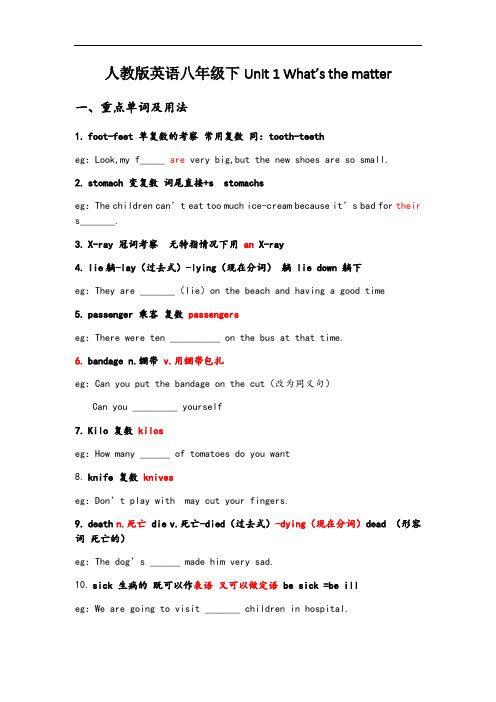
人教版英语八年级下Unit 1 What’s the matter一、重点单词及用法1.foot-feet 单复数的考察常用复数同:tooth-teetheg:Look,my f_____ are very big,but the new shoes are so small.2.stomach 变复数词尾直接+s stomachseg:The children can’t eat too much ice-cream because it’s bad for their s_______.3.X-ray 冠词考察无特指情况下用an X-ray4.lie躺-lay(过去式)-lying(现在分词)躺 lie down 躺下eg:They are _______(lie)on the beach and having a good time5.passenger 乘客复数passengerseg:There were ten __________ on the bus at that time.6.bandage n.绷带v.用绷带包扎eg:Can you put the bandage on the cut(改为同义句)Can you _________ yourself7.Kilo 复数kiloseg:How many ______ of tomatoes do you want8.knife 复数kniveseg:Don’t play with may cut your fingers.9.death n.死亡 die v.死亡-died(过去式)-dying(现在分词)dead (形容词死亡的)eg:The dog’s ______ made him very sad.10.sick 生病的既可以作表语又可以做定语 be sick =be illeg:We are going to visit _______ children in hospital.二、重点短语have a cold =catch a cold =have the flu 感冒 cough 咳嗽lie down 躺下take one’s temperature 量体温 have a fever 发烧take/have breaks/a break 休息=take/have a rest get off 下车-get on 上车to one’s surprise 令某人惊讶的是 right away 立刻马上=right nowget into (trouble)陷入(麻烦) get sunburned 被晒伤be used to (doing)习惯于适应于...... take risks/a risk 去冒险run out (of)用完用尽 cut off 切除get out of 离开从......出来 be in control of 掌管管理give up (doing)放弃(做)某事 have a stomachache 胃痛get an X-ray 做一个X射线检查 thanks to......由于多亏in time 及时 on time 准时 think about 考虑think of认为fall down 摔倒 make a decision 作决定put......on......把....放在...上 be interested in 对...感兴趣三、用法总结1.need to do sth需要做某事eg: The teacher needs_____(rest) for a few minutes.like 意为“听起来像”后接n./adj./句子eg: It sounds like a good idea.类似的感官动词+like:feel like/smell like/ look like/taste like/seem likesound+adj. 结构中,sound 是系动词意为“听起来是”后接形容词eg: That sounds great.+n./doing(v.现在分词) He went to school without having breakfast.eg:He left the classroom without ________ anythingv.同意,赞成agree with sb/某人的意见看法 Does she agree with usagree to do sth 同意做某事 They agreed to solve the problem. problems (in) doing sth做某事有困难=have trouble/difficulty (in) doinghave problems with sth =have trouble/difficulty with sth 在某方面有困难eg:One of my good friends said he had problems__________(learn) English. get used to doing sth 习惯于做某事eg:He used to get up late,but now he is used to getting up early.used to do sth 过去常常做某事(现在不做了)eg:He used to read English in the evening.use sth to do sth 使用用某物做某事eg:So he used knife to cut off his arm.be used to do sth 被动被用于做某事eg:These new pens are used to paint the wall.one’s life 丧失生命 save one’s life 挽救某人的生命eg:He lost his life in the car accident.adj.足够的充足的后接名词n. enough moneyadv.足够地修饰形容词/副词 enough要后置eg:The book is_______,but I don’t have enough money ______it.interesting; to buy enough; to buyenough; buying interesting; buying9. the importance of (doing)sth (做)某事的重要性important adj.重要的 unimportant adj.不重要的 importance n.重要性eg:We students should know the importance of (learning)English. n.决定 make a decision (to do sth)decide to do sth 决定做某事 decide not to do sth 决定不做某事eg:Tom made a decision to study English well.up 放弃give up 是动词+副词结构接代词作宾语时代词放中间eg:The problem is so difficult for you,but don’t _______A.give it up it out up it out itgive up doing sth 放弃做某事eg:You will be very sad if you give up______(sing).用法keep on doing sth 继续做某事(中间有间隔强调重复性)eg:He kept on studying though he was very tired.keep doing sth 继续不停地做某事(不间断连续性)eg:Keep walking until you reach the end of the road.keep sb doing 让某人一直做某事eg:Don’t keep the other students waiting.keep sb from doing sth 阻止某人做某事eg:We should keep the little boy from stepping on the grass.用法find找到,强调寻找的结果 look for强调寻找过程 find out找出查明eg:I was looking for my watch,but I didn’t find it.find sb doing sth 发现某人正在做某事eg:When I walked along the road,I found an old man shouting for help.find it +adj形容词+to do sth 发现做某事是...的eg:She found it hard to finish the work by herself.risks=take a risk 冒险 He likes taking risks.risk one’s life to do 冒着生命危险去做某事eg:He risked his life to save the child.risk doing stheg: The man called Tom often risks flying over the sea.四、短语辨析1.see sb doing sth 看见某人正在做某事(动作正在发生)see sb do sth 看见某人做某事(看到动作全过程或者经常看到动作发生)eg:I saw the boy crying when I passed by(路过).类似的 hear/watch/notice/find+sb do/doing sththanks to 多亏... 由于....=with the help of/with one’s help=because ofthanks for 因.......而感谢强调感谢的原因eg:Thanks to my teacher ,I passed the exam.Thanks for your help .Thanks for inviting me.2.in time 及时表示动作在规定时间内或比规定时间提前发生on time 准时按时指正好在规定时间内eg:Thanks for coming here to help me in time.The train arrived into the station on time.火车准时进站了。
人教版八年级下册英语必考知识点梳理(期末复习必备)

人教版八年级下册英语必考知识点梳理(期末复习必备)八年级下册英语知识点Unit 1 What’s the matter?【重点短语】1.have a fever 发烧2.have a cough 咳嗽3.have a toothache 牙疼4.talk too much 说得太多5.drink enough water 喝足够的水6.have a cold 受凉;感冒7.have a stomachache 胃疼8.have a sore back 背疼9.have a sore throat 喉咙痛10. take risks 冒险11.hot tea with honey 加蜂蜜的热茶12.see a dentist 看牙医13.get an X-ray 拍X 光片14.take one’s temperature 量体温15.put some medicine on sth. 在……上面敷药16. give up 放弃17. sound like 听起来像18. all weekend 整个周末19. in the same way 以同样的方式20. go to a doctor 看医生21. go along 沿着……走22. on the side of the road 在马路边23. shout for help 大声呼救24. without thinking twice 没有多想25. get off 下车26. have a heart problem 有心脏病27. to one’s surprise 另某人惊讶的是28. thanks to 多亏了;由于29. in time 及时30. make a decision 做出决定31. get into trouble 造成麻烦32. right away 立刻;马上33. because of 由于34. get out of 离开;从……出来35. keep on doing sth. 继续或坚持做某事36. put a bandage on sth. 用绷带包扎37. fall down 摔倒38. feel sick 感到恶心39. have a nosebleed 流鼻血40. cut his knee 割伤他的膝盖41. put her head back 把她的头向后仰42. have problems breathing 呼吸困难43. mountain climbing 登山运动44. be used to doing sth. 习惯做某事45. run out (of) 用完;用尽46. so that 以便47. so...that... 如此……以至于...…48. be in control of 掌管;管理49. in a difficult situation 在闲境中【重点句型】1. What's the matter with you?= What'the trouble with you? = What's wrong with you? 你怎么了?2. What should she do? 她该怎么办呢?3.Should I take my temperature? 我应该量一下体温吗?4.You should lie down and rest. 你应该躺下休息一会儿。
人教版八年级英语下册各单元语法点汇总

U n i t1W h a t’s t h e m a t t e r 一、询问某人的健康问运及遭到麻烦的表达方法1询问某人患了何种疾病或遇到了何种麻烦时;常用以下几种结构来表达:What’s the matter with sb.某人怎么了What’s wrong with sb.某人怎么了What’s the trouble with sb.某人出什么事了What happened to sb.某人发生了什么事Are you OK你没事吧Is there anything wrong with sb. 某人有什么事吗(2)要表达身体疼痛或不舒服;可用以下结构:①某人+have/has+病症.The twins have colds.双胞胎感冒了..某人+have/has+a+headache/toothache/stomachache/backache/earache.She had a stomachache last night.她昨晚肚子痛..③某人+have/has+a+sore+发病部位. He has a sore throat.他喉咙痛..④某人+hurts+身体部位或反身代词. He hurt his leg.他的腿受伤了..⑤某部位+hurts.My head hurts badly.我头痛得厉害..⑥某人+have/has+a pain+in one’s+身体部位; I have a pain in my chest.我胸口痛..⑦There issomething wrong with one’s+身体部位.There is something wrong with my right eye..我的右眼有毛病..⑧其他表达方式She has a heart trouble.她有心脏病..He got hit on the head他头部受到了撞击..She cut her finger.她割破手指了..二情态动词should的用法1.Should为情态动词;意为“应该;应当”;否定式为shouldn’t;其后接动词原形;无人称和数的变化..常用来表示征询意见、建议、劝告、要求或义务等.. You should drink hot water with honey.你应该喝加有蜂蜜的开水..He should put his head back他应该把头后仰..We should try our best to help him.我们应当尽力去帮助他.. You shouldn‘t watch TV.你不应该看电视..2.Should用于主语为第一人称的疑问句;表示征询意见.. Should I put some medicine on it 我应当给它敷上药吗 Should we tell her about it我们应该告诉她这件事吗拓展在英语中;表示建议的说法有很多;而且都是中考考查的重点..主要结构有:①Would you like to do sth.你想要/愿意做某事吗Would you like to play basketball with me你想要和我一起打篮球吗②Shall I/we do sth 我/我们做好吗Shall we go to the zoo tomorrow明天我们去动物园;好吗③Why not do sth 为什么不呢Why not join us为什么不加入到我们当中来呢④How/What about doing sth 做某事怎么样 How about going swimming去游泳怎么样⑤Let’s do sth让我们做吧.. Let’s go home.咱们回家吧..⑥You’d better not do sth你最好不要做某事..You’d better not go there alone.你最好不要一个人去那儿..Unit 2 I'll help clean up the city parks动词不定式A. 作主语——为避免句子的头重脚轻;常用it作为形式主语;而真正的主语动词不定式后置..常用句型:It +be+adj./n.+for/of sb. to do sth./It takes sb. some time to do sth.B. 作宾语——动词want; decide; hope; ask; agree; choose; learn; plan; need; teach; prepare…常接动词不定式作宾语..C. 作后置定语——常用于“have/has+sth.+to do”或“enough+名+to do”“It’s time to do sth.”等结构中..D. 作宾语补足语——tell; ask; want; invite; teach; like; call等可接带to的动词不定式作宾语补足语;构成tell/ask/want /call/invite sb. to do sth.结构..“一感feel;二听listen to; 注意动词不定式作使役动词和感官动词的宾语补足语时应省去to:hear;三让let; make; have;;四看look at; see; watch; notice;半帮助help”..E. 动词不定式作状语主要用来修饰动词;表示目的;结果或原因..为了强调目的;有时可以把动词不定式放在句首;或在不定式前加in order to 或so as to “为了;目的是”..常用结构有too + adj./adv. + to do sth.等..F. 固定句式中动词不定式的用法常见的形式有:had better not do sth./Would you like to do sth./Why not do sth./Would you please not do sth.等..Unit 3 Could you please clean your roomCould you please...句型1请求别人时通常用此句型;也可以说:Can you...please情态动词could或can在这里均表示请求;在意思上无区别;但是用could在于其上显得更委婉、客气、诚恳..在日常生活中常使用could you/I...若在句末加上please;则显得更礼貌..Could you help me find my book;please你能帮我找到我的书吗(2)对could you/I...的问句作出肯定回答;常用“sure/certainly/of course”等;如果作否定回答;常用“sorry或oh;please don’t”.. 一般不用no开头;用no显得语气生硬、不礼貌..(3)表示请求的句式:Would you like to do... Would you mind doing... Let’s do.... Shall I/we do... Please do...祈使句前加please提示:could you please...与could I Please...两种问句;前者是请求别人帮忙的句式;后者是有礼貌地向别人请求允许的交际用语..试比较:Could you please help me请你帮我一下好吗Could I please invite my friends to my birthday party;Mom 妈妈; 我能邀请我的朋友参加我的生日聚会吗Unit 4 Why don't you talk to your parents1.提建议向别人发出邀请;请求;建议;或征求某人的意见的其他表达方式:How /what about doing sth.about是个介词;可跟名词或动名词“…怎么样”You’d better not do something.“你最好不做某事”Would you like sth …:“你想要某物Let s do sth…What should I do … should表示请求、征询对方意见2.学会谈论问题和学会用why don't you…提建议向别人发出邀请;请求;建议;或征求某人的意见的表达方式:Why don t you do something =Why not do something 你为什么不做某事呢来表示请求、征询对方意见3.until; so that ;although引导的状语从句:1until:在带有till或until引导的时间状语从句里;如果主句用肯定式;其含义是“一直到……时”;谓语动词只能用延续性动词..如果主句用否定式;其含义是“直到……才……”; “在……以前不……”; 谓语动词可用瞬间动词..Don t get off until the bus stops.2so that引导目的状语从句为了;以便例如:He studies hard so that he could work better in the future3although的用法意思相当于though尽管;虽然;引导让步状语从句..引导的从句不能与并列连词but;and; so等连用;但可以和yet; still等词连用.. 例如:Although he was tired; he went on working.尽管他很累;但是他继续工作..Unit 5 What were you doing when the rainstorm came过去进行时1. 基本概念:过去进行时表示在过去某一时刻或一段时间内正在进行的动作..这一特定的过去时间除有上下文暗示以外; 一般用时间状语来表示..2.结构 was / were not + 动词-ing3.句式肯定式:I/He/She/It was working. We/You/They/ were working.否定式:I/He/She/It was not working.We/You/They/ were not working.疑问式和简略回答:Was I working Yes; you were. No; you were not. Were you working Yes; I was. No; I was not. Was he/she/it working Yes; he/she/it was. No; he/she/it was not. Were we/you/they working Yes; you/we/they were. No; you/we/they were not. 注:1 was not常缩略为wasn’t; were not常缩略为weren’t..2 一般过去时与过去进行时用法的比较: 一般过去时表示在过去某个时间发生过的动作或存在的状态; 而过去进行时则表示在过去某一时刻或某一段时间正在进行的动作.. 例如: David wrote a letter to his friend last night. 大卫昨晚给他的朋友写了封信..信写完了..David was writing a letter to his friend last night. 大卫昨晚一直在给他的朋友写信..信不一定写完..4.过去进行时中的when和whilewhen; while 区别:1)由when引导的时间状语从句;主句用过去进行时;从句应用一般过去时;由while引导的时间状语从句;主句用一般过去时;从句应用过去进行时..When the teacher came in; we were talking.当此句改变主从句的位置时;则为: While we were talking; the teacher came in. 2如果从句和主句的动作同时发生;两句都用过去进行时的时候;多用while引导..如:They were singing while we were dancing.Unit 6 An old man tried to move the mountains1. unless引导条件状语从句unless = if … not ―除非;若不They will go tomorrow unless it rains.= They will go tomorrow if it doesn’t rains.2. as soon as引导时间状语从句.. ―……就He will come and see you as soon as he can.3. so.......that引导结果状语从句句型1:主语+谓语+so+形容词/副词+that从句The wind was so strong that we could hardly move forward.句型2: so +形容词 + a/an + 单数名词 + that从句It was so hot a day that they all went swimming.句型3. so + many/ few + 复数名词 + that从句He has so few friends that he often feels lonely.句型4: so +much/ little + 不可数名词 + that 从句I had so little money that I couldn’t buy a pen.Unit 7 What’s the highest mountain in the world形容词副词的原级、比较级和最高级一原级句型:1. A is as+原级+ as+ B 表示A 与B一样…eg: He is as tall as me.2.A is not as/so +原级+ as B表示A不如B…eg:He is not as tall as me.3.只能修饰原级的词;very;quite;so;too;so; enough; pretty等例如;He is too tired to walk on.他太累了以至于不能再继续走了..(二)比较级句型可以修饰比较级的词;much;a lot;far;…的多a little;a bit;…一点儿 even甚至;still 仍然Eg. Lesson One is much easier than Lesson Two.第一课比第二课容易得多.. Tom looks even younger than before.汤姆甚至比以前更年轻..1.当句中有than 时则用比较级.. eg: He is fatter than me.2.当句子中的比较对象为两者时用比较级:“特殊疑问词+be+形容词比较级;A or B ”eg: Which is bigger;the earth or the moon 哪一个大;地球还是月球3. “比较级+and+比较级”表示“越来越……”..eg.The flowers are more and more beautiful.花儿越来越漂亮..加more构成比较级的形容词则用more and more +形容词表示越来越…eg: English is more and more important.4.“the+比较级;the+比较级”表示“越……;越……”..Eg. The more careful you are;the fewer mistakes you’ll make.5.“A+be+the+形容词比较级+of the two+……”表示“A是两者中较……的”..Eg.Look at the two boys. My brother is the taller of the two.6.A+be+形容词比较级+than+any other+单数名词+介词短语”表示“A比同一范围的任何一个人/物都……”;含义是“A最……”..Eg. The Yangtze River is longer than any other river in China.=The Yangtze River is the longest river in China.三最高级常用句型结构1.“主语+be+the+形容词最高级+单数名词+in/of短语”表示“……是……中最……的”.. eg:Tom is the tallest in his class./of all the students.This apple is the biggest of the five.2.“主语+be+one of the+形容词最高级+复数名词+in/of短语”表示“……是……中最……之一”..Eg:Beijing is one of the largest cities in China.3.“特殊疑问词+be+the+最高级+A;B;or C ”用于三者以上eg Which is the biggest The moon;the sun or ths earth4.“the +序数词+最高级+单数名词+范围”..表示…是第几大…eg: The Yellow River is the second longest river in China .注意形容词最高级之前要加the;但当最高级之前有形容词性物主代词或名词所有格时则不用加theeg: He is the best student in my class. He is my best friend.(四)形容词副词的规则与不规则变化规则变化1.一般在词尾直接加er或est;例如;tall-taller-tallest;long-longer-longest2.以不发音的字母e结尾的单词在词尾直接加r或st;例如;nice-nicer-nicest3.以辅音字母+y结尾的词;把y变为i;再加er或est;例如;heavy-heavier-heaviest4.重读闭音节;末尾只有一个辅音字母;双写这个辅音字母;再加er或est;eg. big-bigger-biggest5.部分双音节词和多音节词分别在原级前加more构成比较级和most构成最高级;例如;slowly-more slowly-most slowly;beautiful- more beautiful-most beautiful 不规则变化Unit 8 Have you read Treasure Island yetUnit 9 Have you ever been to a museum现在完成时 Present Perfect Tense1表示过去发生或已经完成的动作对现在造成的影响或结果..—It’s so dark. 太黑了..—Someone has turned off the light. 有人把灯关上了..2表示从过去某一时间开始并一直持续到现在的动作或状态..常与since+过去的时间点;for+一段时间;since+时间段+ego; so far等时间状语连用.. Eg. I have lived here for ten years.我已经住在这里10年了..从10年前开始;持续到现在还住这儿Eg. I have lived here since 2003. 自从2003年我就住在这儿..从2003年开始;持续到现在还住这儿3 基本结构及句型转换:主语+have/has+过去分词done 当主语是第三人称单数has;其余人称用have..①肯定句:主语+have/has+过去分词+其他 I have finished my homework. 肯定句②否定句:主语+have/has+not+过去分词+其他 I have not finished my homework. 否定句③一般疑问句:Have/Has+主语+过去分词+其他—Have you finished your homework—Yes; I have. / No; I haven’t; 一般疑问句及肯定、否定回答4has gone to; has been to; has been in 的区别Have/Has goneto :去了现在不在说话现场Eg. ---Where is your father---He has gone to Shanghai.Have/Has been to :去过已不在去过的地方Eg. My father has been to Shanghai.Have/has been in:呆了多久还在所呆的地方Eg. My father has been in Shanghai for two months. =My father has been in Shanghaisince two months ago.5现在完成时的标志:①常与just; already; yet; ever; never; before; so far 等连用;强调动作的完成;不强调动作的持续..Have you ever been to Japan I have just finished my homework.②for + 时间段;since + 过去的时间点;since + 段时间 ago;since + 一般过去时的句子..They have known each other for five years. Since he was a child; he has lived in England.(6)动词过去式和过去分词的变化规则变化: 1. 一般在动词词尾直接加ed..如:pick → picked → picked; wish →wished → wished; stay → stayed → stayed2. 以不发音的e结尾的动词后面加d..如:like → liked → liked; hope → hoped →hoped; phone → phoned → phoned3. 以―辅音字母 + y‖结尾的动词;变y为i;再加-ed..如:study → studied → studied; hurry → hurried → hurried; reply → replied → replied4. 词尾只有一个辅音字母的重读闭音节动词;要双写辅音字母;再加-ed..如:stop →stopped → stopped; clap → clapped → clapped不规则变化:5.以不变应万变..如:let → let → let; put → put → put; read → read → read6. 若中间有双写e;则去掉一个e;单词末尾再加t..如:feel → felt → felt; keep → kept → kept; sleep → slept → slept7. 结尾的字母d变t..如:lend → lent → lent; build → built → built; send →sent → sent8. 变为以-ought或-aught结尾..如:buy → bought → bought;bring → brought → brought; catch → caught → caught; teach → taught →taughtUnit 10 I've had this bike for three years.短暂性动词buy; die; join; finish等不能直接与for; since 连用; 需要改变动词..1)beginstart--be on2 open--be open3)become--be4)die--be dead5) fall asleep-- be asleep6)close -- be closed7)end/ finish---be over8) put on--wear9)leave-- be awayfrom 10)catch a cold--have a cold11)join the army--in the army/be a soldier12)borrow---keep13)join the party-- be in the party/ be a party member14) buy---have15come/go/ arrive/reach/get /move to---be in /at总结:1.现在完成时表示过去发生的动作对现在造成的影响和结果;2.还可以表示过去发生的动作;一直持续到现在;也有可能持续下去.3..一般情况下;for+时间段; since+过去的时间点;since + 段时间 ago;since + 一般过去时的句子4.句型:现在完成时态have/has+延续性动词的过去分词+ for/ since...。
人教版八年级英语下册各单元语法点汇总
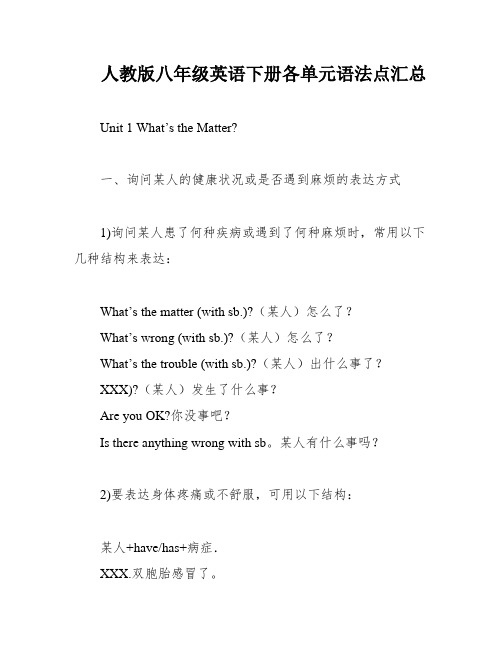
人教版八年级英语下册各单元语法点汇总Unit 1 What’s the Matter?一、询问某人的健康状况或是否遇到麻烦的表达方式1)询问某人患了何种疾病或遇到了何种麻烦时,常用以下几种结构来表达:What’s the matter (with sb.)?(某人)怎么了?What’s wrong (with sb.)?(某人)怎么了?What’s the trouble (with sb.)?(某人)出什么事了?XXX)?(某人)发生了什么事?Are you OK?你没事吧?Is there anything wrong with sb。
某人有什么事吗?2)要表达身体疼痛或不舒服,可用以下结构:某人+have/has+病症.XXX.双胞胎感冒了。
某人XXX.XXX.她昨晚肚子痛。
某人XXX.他喉咙痛。
某人XXX(s)+身体部位或反身代词.XXX his XXX.他的腿受伤了。
某部位+hurt(s).My head hurts badly.我头痛得厉害。
某人+have/has+a pain+in one’s+身体部位,I have a XXX.我胸口痛。
There is) something wrong with one’s+身体部位.There is something wrong with my right eye.我的右眼有毛病。
其他表达方式She has a heart trouble.她有心脏病。
He got hit on the head.他头部受到了撞击。
She cut her finger.她割破手指了。
二、情态动词should的用法情态动词should表示应该做某事,常用于建议、命令、劝告等语境中。
例如:You should see a doctor if you have a fever.如果你发烧了,你应该去看医生。
XXX't eat too much junk food.你不应该吃太多垃圾食品。
人教版英语八年级下册第一单元知识点
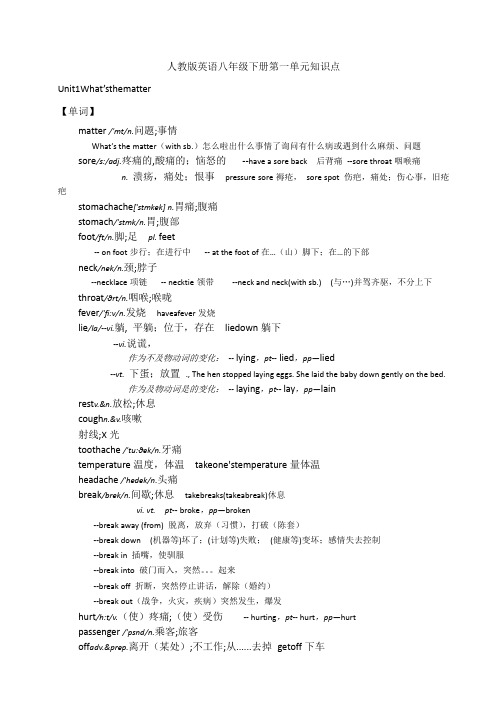
人教版英语八年级下册第一单元知识点Unit1What’sthematter【单词】matter /'mt/n.问题;事情What’s the matter(with sb.)怎么啦出什么事情了询问有什么病或遇到什么麻烦、问题sore/s:/adj.疼痛的,酸痛的;恼怒的--have a sore back 后背痛--sore throat咽喉痛n. 溃疡,痛处;恨事pressure sore褥疮,sore spot 伤疤,痛处;伤心事,旧疮疤stomachache['stmkek] n.胃痛;腹痛stomach/'stmk/n.胃;腹部foot/ft/n.脚;足pl. feet-- on foot步行;在进行中-- at the foot of在…(山)脚下;在…的下部neck/nek/n.颈;脖子--necklace项链-- necktie领带--neck and neck(with sb.) (与…)并驾齐驱,不分上下throat/θrt/n.咽喉;喉咙fever/'fi:v/n.发烧haveafever发烧lie/la/--vi.躺, 平躺;位于,存在liedown躺下--vi.说谎,作为不及物动词的变化:-- lying,pt-- lied,pp—lied--vt. 下蛋;放置., The hen stopped laying eggs. She laid the baby down gently on the bed.作为及物动词是的变化:-- laying,pt-- lay,pp—lainrest v.&n.放松;休息cough n.&v.咳嗽射线;X光toothache /'tu:θek/n.牙痛temperature温度,体温takeone'stemperature量体温headache /'hedek/n.头痛break/brek/n.间歇;休息takebreaks(takeabreak)休息vi. vt.pt--broke,pp—broken--break away (from) 脱离,放弃(习惯),打破(陈套)--break down (机器等)坏了;(计划等)失败;(健康等)变坏;感情失去控制--break in 插嘴,使驯服--break into 破门而入,突然。
八年级下册人教版英语第一单元3a知识点

八年级下册人教版英语第一单元3a知识点在八年级下册人教版英语第一单元3a的学习中,我们需要掌握以下几个知识点:1. 一般现在时态一般现在时态表示经常发生的动作,习惯或者事实。
它的构成是:主语+动词原形(第三人称单数加s)。
例如:He usually goes to school by bus.(他通常乘公交车上学。
)2. 一般过去时态一般过去时态表示过去某个时间发生的动作或者事件。
它的构成是:主语+动词过去式。
例如:I watched TV last night.(我昨晚看电视了。
)3. 句子的基本结构英语句子的基本结构是:主语+谓语+宾语。
其中,主语通常是表示动作的人或物;谓语是说明主语动作或者状态的动词;宾语是接受动作的人或物。
例如:She eats an apple.(她吃了一个苹果。
)4. 形容词和副词的用法形容词用来描述名词或代词的特征或状态,放在名词或代词之前。
例如:The tall boy is my brother.(那个高个子的男孩是我弟弟。
)副词用来描述动词、形容词或其他副词的状态或特征,放在所修饰词的后面。
例如:She sings well.(她唱歌唱得很好。
)5. 物主代词的用法物主代词用来代替名词或代词所表示的人或物的所有格,分为形容词性物主代词和名词性物主代词。
形容词性物主代词用来修饰名词,放在名词之前;名词性物主代词则直接代替名词。
例如:She is my sister.(她是我的妹妹。
)以上就是八年级下册人教版英语第一单元3a知识点的简要介绍,希望能够对同学们的英语学习有所帮助。
当然,光掌握这些知识点还不够,还需要在实际学习和应用中不断去巩固和提高自己的语言技能。
新人教版八年级英语下册第一单元知识点

Unit 1 What’s the matter?一.询问某人患了何种疾病或遇到什么麻烦时,常用以下句型:1.What’s the matter (with sb)?2. What’s the trouble / problem (with sb)?3.What’s wrong (with sb)? 你怎么了?4. What’s one’s trouble / problem ?5.What’s up ?6. What happened to sb ?7.Are you OK ? 8. Is there anything wrong with sb ? 二.表达身体不适或疼痛时,常用以下结构:1.Sb + have /has + a / an + 疾病名称:have a cold / fever / cough / temperature2.Sb + have/ has a sore +身体部位:have a sore throat / back3.Sb + have / has+ a+ 身体部位—ache have a toothache /headache / stomachache / earache /backache4.Sb + hurt(s) +身体部位/ oneself ; He hurt his leg . 或身体部位+ hurts ; My head hurts badly .5.There is something wrong with one’s +身体部位。
6.Sb +have /has a pain in one’s +身体部位三.情态动词should / should’t 的用法:意为’应该,应当’后接动词原形,无人称和数的变化。
通常表示提出意见或建议,或义务和责任,还可表示命令责备或要求等语气;1. You should lie down and rest .2.You should’t eat so much next time .3. What should I do ?4. Should I put some medicine on it ?----Yes ,you should ./ No, you should’t. Section A1.sore adj. 疼痛的可作定语或表语She has a sore throat / back . My leg is verysore .2.back n. 后面,背面He sat at the back of the classroom. adv . 回(原处)come back3. lie 躺,卧---lay. lain.lying lie down 躺下撒谎---lied.lied .lying You are lying to me .n. 谎言假话tell a lie / lies lay .---laid .laid. laying 产卵下蛋放置4. rest 休息v./n. You should rest for a few days . get some rest= have(take) a rest /a break / breaks休息一下5. to one ‘s surprise 使某人惊讶的是常作插入语,位于句首To his surprise,she failed the exam .in surprise 吃惊地surprising ----物What surprising news ! Surprised---- 人be surprised to do / be surprised at sth / be surprised that…6. much too+ 形容词,太...... ,too many+可数名词复数,太多……too much+不可数名词,太多…也可做副词talk too much7. enough形容、副词,足够的/地,(1) enough +名词; enough water (2) 形副+ enough ; good enough8. sound like+名词代词和从句:听起来像It sounds like you don’t know the truth.. It sounds like a good idea.Sound( look/feel/taste/smell )+形容词听起来... eg. The music sounds nice.9. need (1).需要,实义动词人作主语need+sth,需要某物;need (sb)to do sth.需要做某事,(2). 物作主语;sth needs doing/ to be done ; The room needs cleaning /to be cleaned.(3) 情态动词,多用于否定句或疑问句Need I stay here ?---Yes, you must . /No, you need’t.10. agree 同意,赞同---disagree(反义词) agree with sb. 同意某人agree to do. 同意做某事11. right away =right now =at once,意为马上。
人教版八年级英语下册1-5单元知识点归纳
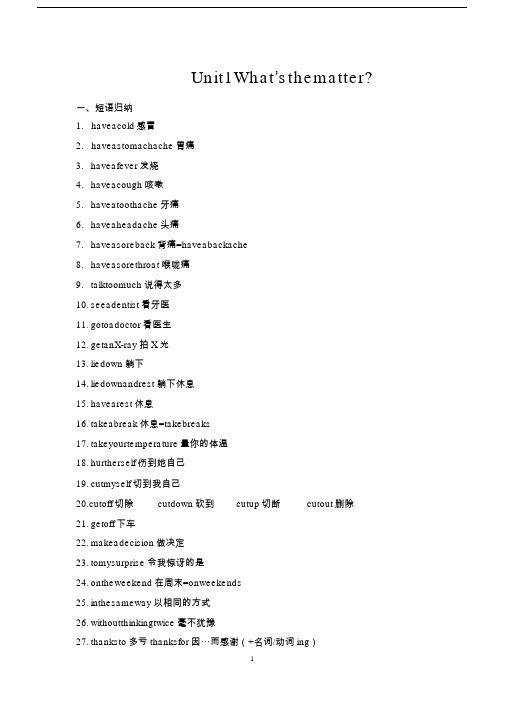
Unit1What’sthematter?一、短语归纳1.haveacold感冒2.haveastomachache胃痛3.haveafever发烧4.haveacough咳嗽5.haveatoothache牙痛6.haveaheadache头痛7.haveasoreback背痛=haveabackache8.haveasorethroat喉咙痛9.talktoomuch说得太多10.seeadentist看牙医11.gotoadoctor看医生12.getanX-ray拍X光13.liedown躺下14.liedownandrest躺下休息15.havearest休息16.takeabreak休息=takebreaks17.takeyourtemperature量你的体温18.hurtherself伤到她自己19.cutmyself切到我自己20.cutoff切除cutdown砍到cutup切断cutout删除21.getoff下车22.makeadecision做决定23.tomysurprise令我惊讶的是24.ontheweekend在周末=onweekends25.inthesameway以相同的方式26.withoutthinkingtwice毫不犹豫27.thanksto多亏thanksfor因⋯而感谢(+名词/动词ing)28.intime及时ontime按时29.savealife挽救生命30.getintotrouble陷入麻烦31.rightaway马上32.falldown跌倒33.waitfor等待34.beinterestedindoingsth.对做某事感兴趣35.giveup放弃二、用法集萃1.询问有什么病或有什么麻烦:What’sthematter(withsb.)?2.疾病的表达:have/hasa+疾病名称3.太多:toomuch+不可数名词;toomany+可数名词复数形式太:muchtoo+形容词4. enough足够的:①形容词+enough②enough+名词③itisenough+todosth.5. lie躺下过去式:lay现在分词:lying6.seesb.doingsth.看见某人正在做某事(正在进行)seesb.dosth.看见某人做了某事(看见动作的全过程)7.expecttodosth.期望做某事8.needtodosth.需要做某事9.helpsb.(to)dosth.帮助某人做某事10.tellsb.(not)todosth.告诉某人(不要)做某事11.asksb.todosth.要求某人做某事12.wanttodosth.想要做某事13.agreetodosth同.意做某事disagreetodosth.不同意做某事agreewithsb.同意某人的意见14.trouble问题;麻烦havetrouble/problemdoingsth.做某事有困难15.介词+doing常见的介词有:at;for;with;without;inabout16.be/getusedtodoingsth.习惯于做某事17.keepondoingsth.继续做某事18.minddoingtsh.介意做某事19.反身代词:myself我自己yourself你自己himself他自己herself她自己itself它自己复数:ourselves我们自己yourselves你们自己themselves他们自己20.knife-knives刀名词复数规则变化:①一般情况+s②以e结尾+s③以s、x、ch、sh结尾+es④以辅音字母+y结尾,变y为i+es⑤以o结尾,有生命+es;无生命+s⑥以f/fe结尾,变f/fe为v+es不规则变化:foot-feet脚、足tooth-teeth牙齿man-men男人woman-women女人mouse-mice老鼠21.important重要的importance重要性different不同的difference差异性22.death死亡(名词)die死(动词)dead死的(形容词)三、书面表达Howtokeephealthy如何保持健康Healthisimportant.Everyonewantstobehealthy.Letmetellyouhowtokeephealthy.Firstofall,weshouldeathealthyfood.Weshouldeatmorevegetablesandfruit.Wealson eedtodrinkmilk.Secondly,weshouldexercisealot.Weshoulddosomesportsafterschool.Finally,weshouldhaveenoughsleep.Tohaveagoodrest,weshouldgotobedearlyandgetupearly.Ithinkitisimportantforustokeephealthy.3Unit2I’llhelptocleanupthecityparks.一、短语归纳1. cleanup打扫干净cheerup使兴起来代词放中间2.giveout分发3.handout分发eupwith想出;提出(idea、plan等)5. putoff推迟puton穿衣服putup张贴putaway把⋯收好6.callup打电话;征召edtodosth.曾经做某事beusedtodingsth习.惯于做某事8. lonely孤独的(常用于feel之后)alone独自一人9.carefor照顾=takecareof10.afeelingofsatisfaction一种满足感11.tryout参加⋯选拔12.raisemoney募捐13.fixup修理14.giveaway赠送(money、oldclothes/books等)giveup放弃15.takeafter(外貌或行为)像16.besimilarto与⋯相似17.setup建立18.makeadifference影响;有作用19.disabledpeople残疾人20.makeaplan制定计划21.oldpeople’shome养老院22.helpoutwithsth.帮助解决困难23.abooklover书迷24.attheageof在⋯岁时etrue实现(与dream连用)26.atthesametime同时27.homelesspeople无家可归的人28.beworriedabout为⋯而担心worryabout担心29.forexample例如30.runoutof用完31.not⋯anymore不再32.atonce立刻;马上=rightaway二、用法集萃1.volunteertodosth自愿做某事2. difficult困难的difficulty困难havedifficulty(in)doingsth.做某事有困难3.excited兴奋的(人作主语)exciting使人兴奋的(物作主语)口诀:人+ed物+ing4.疑问词(how,what,where)+todo5. decidetodosth.决定做某事名词形式:decision makeadecision做决定6.learntodosth.学习做某事7.agoodwaytodosth.做某事的好方法8.wouldliketodosth.=wanttodosth.想要做某事9.thankyouforsth./doingsth.因某事/做某事而感谢10.kind善良的kindness善意Unit3Couldyoupleasecleanyourroom?一、短语归纳1.dothedishes清洗餐具2.takeouttherubbish倒垃圾3.foldtheclothes叠衣服foldmy/your/hisclothes4.sweepthefloor扫地5.makethebed铺床makemy/your/hisbed6.cleanthelivingroom打扫客厅7.helpoutwithsth.帮助解决某事8.atleast至少eover过来;顺便来访10.infrontof在⋯前面11.takethedogforawalk遛狗12.allthetime一直13.assoonas一⋯就⋯14.insurprise惊讶地15.hangout闲逛16.dochores做家务17.awasteoftime浪费时间18.inorderto为了19.getgoodgrades取得好成绩20.dependon依靠21.takecareof=carefor=lookafter照顾22.asaresult结果23.fallill生病二、用法集萃1.finishdoingsth.完成做某事2.if如果(主将从现,if后为从句,用一般现在时);是否(位于动词之后)3.assoonas一⋯就⋯.主将从现,assoonas后为从句4.replyangrily生气地回答(副词修饰动词,一般位于动词之后)abeautifuldog一只漂亮的狗(形容词修饰,名词,位于名词前)口诀:形名动副5.beangrywithsb.生某人的气6.as+形容词原级+as和⋯一样7.neitherdidI我也没有neither+be动词/助动词(do/does/did)/情态动词+主语“主语也不⋯..”so+be动词/助动词(do/does/did)/情态动词+主语“主语也⋯”8.can-could可以can,could还可以表示请求,could比can更有礼貌肯定回答:Sure./Ofcourse./Noproblem./Yes,sure.否定回答:No,youcan’t./Sorry,Ican’t.9.asksb.todosth.要求某人做某事10.borrow⋯from⋯跟⋯借(借进来)lend⋯to⋯把⋯借给⋯.(借出去)11.invitesb.todosth.邀请某人做某事12.helpwithsth.helpsb.(to)dotsh.帮助做某事13.havetimetodosth.有时间做某事havenotimetodosth没.时间做某事14.letsb.dosth.让某人做某事15.makesb.dosth.让某人做某事16.spend花费人+spend+时间+onsth/doingsth在某事上花时间/花时间做某事cost花费物+cost+金钱$某物花了多少钱take(took)花费Ittakes/tooksb.+时间+todo.做某事花了某人多少时间payfor付费17.itis+adj(forsb.)+todosth.做某事对某人而言是⋯的18.fair公平的unfair不公平的fairness公平性19.doone’spartindoingsth.尽自己的职责做某事20.the+比较级,the+比较级越...越⋯比较级and比较级越⋯越⋯theearlier⋯thebetter越早越好betterandbetter越来越好Unit4Whydon’tyoutalktoyourparents?一、短语归纳1.talkto/withsb.与某人交谈talkaboutsth.谈论某事2.freetime空闲时间3.allowab.todosth.允许某人做某事allowdoingsth.允许做某事4.hangout闲逛5.getintoafight争吵;打架6.sothat为了;以便于7.lookthrough浏览;快速查看8.workout成功地发展;解决9.getonwith/getalongwith和睦相处municatewithsb.与某人交谈11.abigdeal重要的事petewithsb.与某人竞争13.examskills应试技巧14.cutout删除pare⋯with⋯比较16.not..until直到⋯才17.arguewithsb.与某人争吵18.noproblem没问题19.not..anymore不再20.inmyopinion依我看21.thanksfor因⋯而感谢22.allkindsof各种各样的23.worryabout为⋯而担心=beworriedabout二、用法集萃1.提建议句型:①Youshould/shouldn’t dosth.②How/Whataboutdoingsth.?③Whydon’tyoudosth.?④Whynotdosth.?⑤Shallwedosth.?⑥Let’sdosth.⑦You’dbetterdosth.⑧Wouldyouminddoingsth.?常见回答:Goodidea./Soundsinteresting./I’dliketo./Great.否定:I’dloveto,butIhaveto⋯/Sorry,Ican’t.2.beangrywithsb.生某人的气3. although/though虽然不与but连用4.advice建议(不可数名词)5.refusetodosth.拒绝做某事6.instead代替;反而(位于句首或句尾)insteadof代替(位于句中)7.offertohelp提供帮助8.minddoingsth.介意做某事9.continuetodo/doingath.继续做某事10.keepondoingsth.继续做某事11.afew一些(肯定)few一点点(否定)修饰可数名词复数形式alittle一些(肯定)little一点点(否定)修饰不可数名词做题步骤:先看横线后的名词,判断可数还是不可数;其次,理解句子表达的肯定还是否定12.it’s timeforsth.该做某事了=it’stimetodosth.pete竞争(动词)competition竞争(名词)14.havetimetodosth有.时间做某事Unit5Whatwereyoudoingwhentherainstormcame?一、短语归纳1.gooff闹钟发出响声2.rainheavily下大雨3.pickup接电话;采摘4.atfirst起先5.fallasleep进入梦乡6.diedown逐渐变弱7.havealook看一看8.makeone’sway费力地前进9.insilence沉默10.takedown拆除;往下拽;记录11.atthetimeof⋯当⋯.的时候12.waitfor等待13.atthattime在那时(一般过去时标志词)14.wakeup醒来15.goshopping去购物16.takeashower洗澡17.inamess乱七八糟18.forexample例如19.makesure确保二、用法集萃1.过去进行时定义:表示在过去某一时刻或某一时间段正在进行的动作。
人教版八年级下册各单元英语语法解析知识重点总结
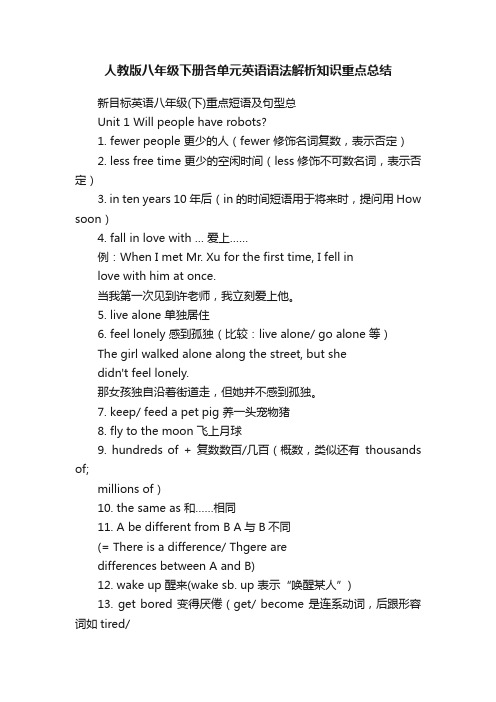
人教版八年级下册各单元英语语法解析知识重点总结新目标英语八年级(下)重点短语及句型总Unit 1 Will people have robots?1. fewer people 更少的人(fewer 修饰名词复数,表示否定)2. less free time 更少的空闲时间(less 修饰不可数名词,表示否定)3. in ten years 10年后(in 的时间短语用于将来时,提问用How soon)4. fall in love with … 爱上……例:When I met Mr. Xu for the first time, I fell inlove with him at once.当我第一次见到许老师,我立刻爱上他。
5. live alone 单独居住6. feel lonely 感到孤独(比较:live alone/ go alone 等)The girl walked alone along the street, but shedidn't feel lonely.那女孩独自沿着街道走,但她并不感到孤独。
7. keep/ feed a pet pig 养一头宠物猪8. fly to the moon 飞上月球9. hundreds of + 复数数百/几百(概数,类似还有thousands of;millions of)10. the same as 和……相同11. A be different from B A与B不同(= There is a difference/ Thgere aredifferences between A and B)12. wake up 醒来(wake sb. up 表示“唤醒某人”)13. get bored 变得厌倦(get/ become 是连系动词,后跟形容词如tired/angry/ excited 等)14. go skating 去滑冰(类似还有go hiking/ fishing /skating/ bike riding 等)15. lots of/ a lot of 许多(修饰可数名词、不可数名词都可以)16. at the weekends 在周末17. study at home on computers 在家通过电脑学习18. agree with sb. 同意某人(的意见)19. I don't agree. = I disagree. 我不同意。
- 1、下载文档前请自行甄别文档内容的完整性,平台不提供额外的编辑、内容补充、找答案等附加服务。
- 2、"仅部分预览"的文档,不可在线预览部分如存在完整性等问题,可反馈申请退款(可完整预览的文档不适用该条件!)。
- 3、如文档侵犯您的权益,请联系客服反馈,我们会尽快为您处理(人工客服工作时间:9:00-18:30)。
Unit9 单元知识汇总
【短语归纳】
1. at night在夜晚
2. in a more natural environment在一个更加自然的环境中
3. all year round一年到头;终年
4. be far from 离……远
5. in the dark 在黑暗中
6. in the past 在过去
7. have been to sp. 去过某地
8. science museum 科学博物馆
9. history museum 历史博物馆
10. amusement park 游乐园
11. go somewhere different 去不同的地方
12. go skating 去滑冰
13. take the subway 坐地铁
14. a great way to spend a Saturday afternoon一个过周六下午的好方法
15. all the old movie cameras所有的古老的电影摄影机
16. learn about sth.解有关……的情况
17. on the weekend 在周末
18. camp in the mountains 在大山里露营
19. put up a tent搭帐篷
20. in such a rapid way 以如此迅猛的方式
21. different kinds of各种各样的
22. development of toilets 厕所的发展
23. social groups 社会团体
24. the tea art performances茶艺表演
25. make a perfect cup of tea with beautiful tea sets用漂亮的茶具沏一杯完美的茶
26. a nice place to enjoy tea 一个品茶的好地方
27. thousands of…数以千计的……
28. International Museum of Toilets国际厕所博物馆
29. the Terracotta Army 兵马俑
30. Southeast Asia东南亚
31. Night Safari 夜间动物园
32. three quarters 四分之三
33. an English-speaking country一个讲英语的国家
34. have problem doing sth. 做某事很困难
35. during the daytime在白天
36. a couple of times 好几次
37. right now 现在;目前
38. an amusement park with a special theme
一个有特别的主题的游乐园
39. walk around the park 在公园里到处走
40. hear of 听说
41. take a ride兜风
42. another province另一个省
43. t he Bird’s Nest鸟巢
44. encourage sb. to do sth.鼓励某人做某事
45. on the one hand... on the other hand…一方面,另一方面
【用法集萃】
1. a great way to do sth. 一个做某事的好方法
2.It’s unbelievable that...很难相信……
3. watch sb. do sth观看某人做了某事
4. encourage sb. to do sth.鼓励某人做某事
5. as... as...和……一样……
6. love doing sth.喜欢做某事
7. want to do sth.想要做某事
8. see sb. doing sth.看见某人正在做某事
9. have problems (in) doing sth.做某事很费劲
10. seem+形容词看起来像……
11. the best time to do sth.做某事的最佳时间
12. choose to do sth.选择做某事
13. tell sb. to do sth.告诉某人做某事
【典句必背】
1. Have you ever been to a science museum?
你曾经去过科学博物馆吗?
2. Let’s go somewhere different today.我们今天去个不同的地方吧。
3. It’s unbelievable that technology has progressed in such a rapid way!
科技以如此迅猛的方式发展真是令人难以置信啊!
4. Whether you like Indian food, Western food or Japanese fo od, you’ll find it all in Singapore!
不管你喜欢印度食品、西方食品还是日本食品,在新加坡你都能找到!
5. One great thing about Singapore is that the temperature is almost the same all year round.新加坡一个很大的特征是它的气温几乎一年到头都是一样的。
6. It is best to visit Singapore...
最好……游览新加坡。
